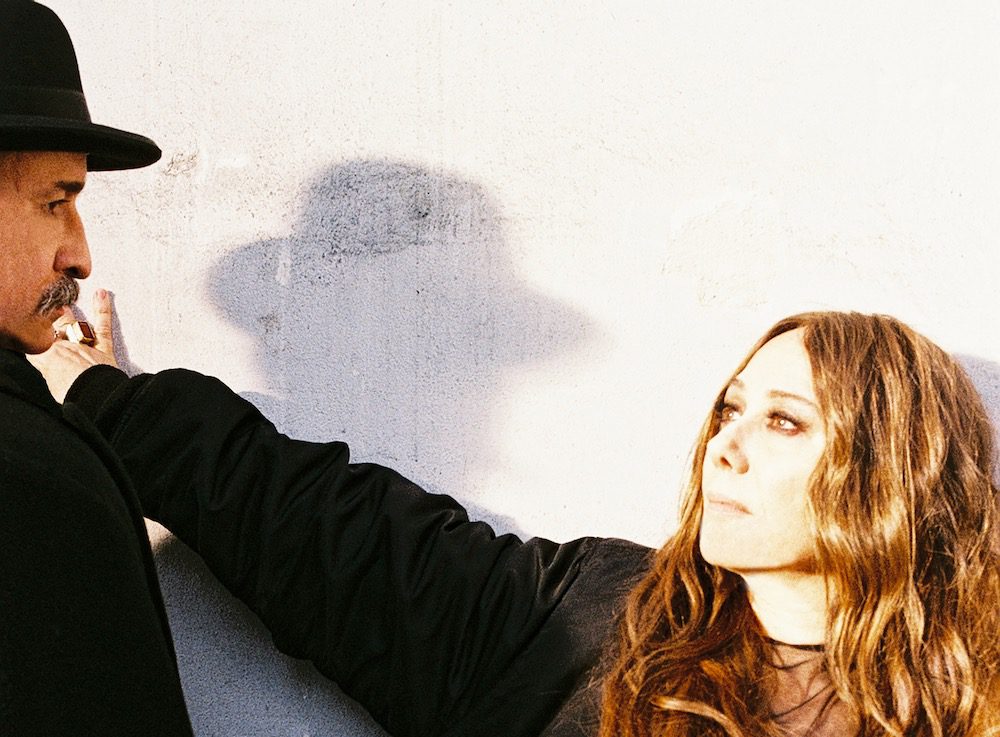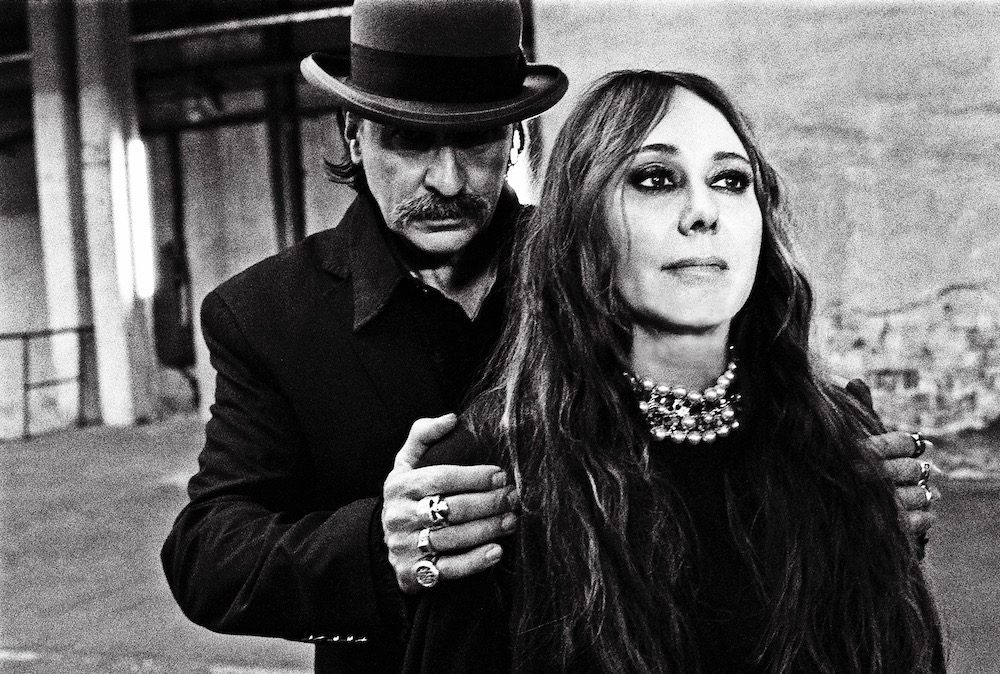

If there’s one song that truly encapsulates the frustration of life right now, it’s “Babel,” from hackedepicciotto’s latest album, The Silver Threshold. Over music that rises and falls with cinematic tension, Danielle de Picciotto tells the story of the Tower of Babel, of the construction of a building intended to reach heaven, of a God who splits their one language into many and of a people divided when they can no longer communicate.
“All of our songs always deal a lot with our situation and the situation that we feel confronted with, in general, around us,” says de Picciotto, who is joined by Alexander Hacke, on a video call from the duo’s studio in Berlin. Since The Silver Threshold came together in the midst of the COVID-19 pandemic and a series of global upheavals that happened in 2020, that certainly played a part in the album’s evolution.
“When we were writing it, I had the feeling for quite some time that people don’t seem to understand each other anymore,” de Picciotto explains. “As the pandemic progressed, that feeling got stronger and stronger. You had the feeling that you were talking to friends that you had known for your whole life and they just didn’t understand you anymore and you didn’t understand them.”
That situation reminded de Picciotto of the Tower of Babel story told in the book of Genesis (though there are parallels to the story throughout a variety of cultures). “I wasn’t raised religiously, but there were a couple of Bible stories that I always thought were interesting,” she says. “I very often have the feeling that we’re actually experiencing that which, in the Bible, was mentioned being in the very beginning.” She points out this is intended to be a contemporary commentary reflective of current global situations, asking the rhetorical question: “Do we realize that somehow, for some reason, we are in this state where we do not understand each other anymore?”
“That doesn’t mean enemies or people from different countries, but even your best friend,” she adds. “There’s something wrong in our communication and we have to figure that out again.”
When the pandemic hit, hackedepicciotto, as de Picciotto says, considered themselves “touring nomads,” though the couple had long been associated with Berlin. De Picciotto is a U.S. born multi-disciplinary artist who moved to Berlin in 1987 and co-founded the city’s infamous Love Parade. She’s also released a number of solo and collaborative albums, written multiple books, made several films and has had her art shown in galleries and museums in Europe and North America. Hacke was born in Berlin and was just a teenager when he joined Einstürzende Neubauten, who would go on to become legendary force in underground and experimental music. He’s also played with Crime and the City Solution and composed a number of film scores.
The two have been collaborating on music together for 20 years now and, about a decade ago, they gave up their home and hit the road, mastering the ins-and-outs of checking gear onto planes as they played in various parts of the world. Their last album, The Current, was released in early 2020 and they had just begun a tour in support of that when the pandemic hit. Hacke recalls that he had planned to cancel the lease on their recording studio for that year, but had missed the deadline. It was “a very lucky coincidence,” he says. “Otherwise, if we hadn’t had that, we would have no place to hang out and work.”
Their final pre-COVID gig was in Frankfurt. Back in Berlin, they caught up on sleep. “We weren’t jet-lagged for the first time in years,” jokes de Picciotto. They also gave virtual performances a chance, although it wasn’t really their thing. “We missed the interaction with the audience, so we didn’t go on doing that as long as we planned,” she says.
“It is very different performing for an iPhone and a tripod than for people,” adds Hacke.
Meanwhile, de Picciotto wrote another book and Hacke worked on film music. “We don’t participate in the Berlin nightlife as much as we used to anyway. We don’t go out drinking or anything like that, so we did not miss that,” says Hacke. “It was really a time to immerse yourself into things that you were only talking about doing in previous years.”
In the late summer of 2020, they started writing new material as hackedepicciotto. They also earned a grant to fund their work and were signed to Mute. “The stars were aligned in a good way,” says de Picciotto.
Before they began recording at the end of 2020, they posed for a photo shoot with Sven Marquardt, an old friend of de Picciotto who is also well-known as the doorman at Berghain. “I always wanted him to take photos for our album, because I’ve done other shoots for him, but not of music,” says de Picciotto. While they don’t normally take press photos before recording the album, they did this time because of concerns of another lockdown.
“It really influenced us,” says de Picciotto of the film shoot, which became the basis of the music video for “Kirchhain.” “He works with analog cameras and only works with daylight. In that way, his pictures have this incredible aura and that really helped us with our music.”
“Also, he projects this authority,” adds Hacke. “You cannot bullshit him. He looks straight through you and that’s what makes the pictures great, because you have to be yourself.”

The Silver Threshold is designed so that each song goes up a key in the scale, beginning with D. The music is as reflective of the tempestuousness of 2020 as the lyrics. Take “Babel” as an example. “We work with strategies to illustrate conflict, like rhythms counteracting to each other and stuff like that,” says Hacke. “It gives you a feeling of uneasiness or a feeling of [being] out-of-whack. Rhythmically, I like to do these things, stuff that makes you lose your balance or something.”
The album also includes hackedpicciotto’s first love song, “Evermore,” a duet that came as a result of the lockdown situation and sounds as if the couple are singing to each other while caught in the midst of downpour. “We had that feeling that this pandemic was a storm that came upon mankind and we were all standing in this storm,” says de Picciotto. “We felt that the most important thing during the storm was to keep in contact with your friends and loved ones… because everybody was so separated. It was us two and, during the whole time of the pandemic when lockdown was really heavy, we felt like it was us two standing in this tiny little nutshell, which was our studio, and the storm raging around us and the only thing that kept us alive in the storm was our love.”
With “Evermore,” they brought the connection that they share into the lyrics. Says Hacke, “This is the first time that we also actually speak to each other lyrically, rather than describing something or proclaiming something to the outside world.”
The Silver Threshold, and “Evermore” in particular, taps into a chemistry that has always been part of their collaboration as hackedepicciotto. “I think that what makes this project work so well is that we are so confident and we trust each other so much,” says Hacke, surmising that it’s this kind of honesty that appeals to fans. “It’s a different set up than a regular band in that way.”
Follow hackedepicciotto on Facebook and Instagram for ongoing updates.



